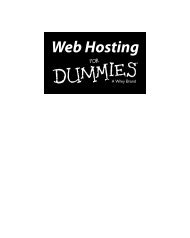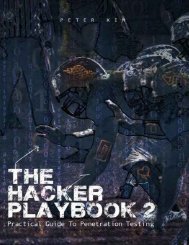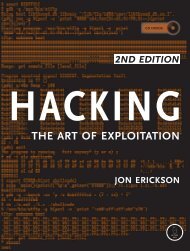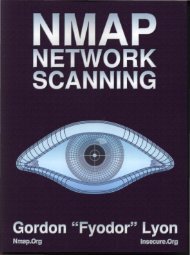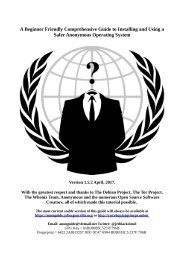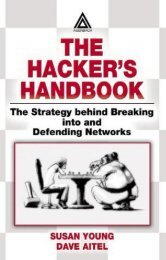- Page 3 and 4:
The Web Application Hacker’s Hand
- Page 5 and 6:
About the Authors Dafydd Stuttard i
- Page 7 and 8:
MDSec: The Authors’ Company Dafyd
- Page 9 and 10:
Acknowledgments We are indebted to
- Page 11 and 12:
Contents Introduction xxiii Chapter
- Page 13 and 14:
Contents xi Chapter 5 Bypassing Cli
- Page 15 and 16:
Contents xiii Testing Restrictions
- Page 17 and 18:
Contents xv Payloads for XSS Attack
- Page 19 and 20:
Contents xvii “Off-by-One” Vuln
- Page 21 and 22:
Contents xix Technical Challenges F
- Page 23:
Contents xxi 12 Miscellaneous Check
- Page 26 and 27:
xxiv Introduction attacker. If you
- Page 28 and 29:
xxvi Introduction Chapters 6, 7, an
- Page 30 and 31:
xxviii Introduction internal workin
- Page 32 and 33:
xxx Introduction If you want to foc
- Page 34 and 35:
xxxii Introduction web users that d
- Page 37 and 38:
CHAPTER 1 Web Application (In)secur
- Page 39 and 40:
Chapter 1 n Web Application (In)sec
- Page 41 and 42:
Chapter 1 n Web Application (In)sec
- Page 43 and 44:
Chapter 1 n Web Application (In)sec
- Page 45 and 46:
Chapter 1 n Web Application (In)sec
- Page 47 and 48:
Chapter 1 n Web Application (In)sec
- Page 49 and 50:
Chapter 1 n Web Application (In)sec
- Page 51:
Chapter 1 n Web Application (In)sec
- Page 54 and 55:
18 Chapter 2 n Core Defense Mechani
- Page 56 and 57:
20 Chapter 2 n Core Defense Mechani
- Page 58 and 59:
22 Chapter 2 n Core Defense Mechani
- Page 60 and 61:
24 Chapter 2 n Core Defense Mechani
- Page 62 and 63:
26 Chapter 2 n Core Defense Mechani
- Page 64 and 65:
28 Chapter 2 n Core Defense Mechani
- Page 66 and 67:
30 Chapter 2 n Core Defense Mechani
- Page 68 and 69:
32 Chapter 2 n Core Defense Mechani
- Page 70 and 71:
34 Chapter 2 n Core Defense Mechani
- Page 72 and 73:
36 Chapter 2 n Core Defense Mechani
- Page 75 and 76:
CHAPTER 3 Web Application Technolog
- Page 77 and 78:
Chapter 3 n Web Application Technol
- Page 79 and 80:
Chapter 3 n Web Application Technol
- Page 81 and 82:
Chapter 3 n Web Application Technol
- Page 83 and 84:
Chapter 3 n Web Application Technol
- Page 85 and 86:
Chapter 3 n Web Application Technol
- Page 87 and 88:
Chapter 3 n Web Application Technol
- Page 89 and 90:
Chapter 3 n Web Application Technol
- Page 91 and 92:
Chapter 3 n Web Application Technol
- Page 93 and 94:
Chapter 3 n Web Application Technol
- Page 95 and 96:
Chapter 3 n Web Application Technol
- Page 97 and 98:
Chapter 3 n Web Application Technol
- Page 99 and 100:
Chapter 3 n Web Application Technol
- Page 101 and 102:
Chapter 3 n Web Application Technol
- Page 103 and 104:
Chapter 3 n Web Application Technol
- Page 105 and 106:
Chapter 3 n Web Application Technol
- Page 107:
Chapter 3 n Web Application Technol
- Page 110 and 111:
74 Chapter 4 n Mapping the Applicat
- Page 112 and 113:
76 Chapter 4 n Mapping the Applicat
- Page 114 and 115:
78 Chapter 4 n Mapping the Applicat
- Page 116 and 117:
80 Chapter 4 n Mapping the Applicat
- Page 118 and 119:
82 Chapter 4 n Mapping the Applicat
- Page 120 and 121:
84 Chapter 4 n Mapping the Applicat
- Page 122 and 123:
86 Chapter 4 n Mapping the Applicat
- Page 124 and 125:
88 Chapter 4 n Mapping the Applicat
- Page 126 and 127:
90 Chapter 4 n Mapping the Applicat
- Page 128 and 129:
92 Chapter 4 n Mapping the Applicat
- Page 130 and 131:
94 Chapter 4 n Mapping the Applicat
- Page 132 and 133:
96 Chapter 4 n Mapping the Applicat
- Page 134 and 135:
98 Chapter 4 n Mapping the Applicat
- Page 136 and 137:
100 Chapter 4 n Mapping the Applica
- Page 138 and 139:
102 Chapter 4 n Mapping the Applica
- Page 140 and 141:
104 Chapter 4 n Mapping the Applica
- Page 142 and 143:
106 Chapter 4 n Mapping the Applica
- Page 144 and 145:
108 Chapter 4 n Mapping the Applica
- Page 146 and 147:
110 Chapter 4 n Mapping the Applica
- Page 148 and 149:
112 Chapter 4 n Mapping the Applica
- Page 150 and 151:
114 Chapter 4 n Mapping the Applica
- Page 153 and 154:
CHAPTER 5 Bypassing Client-Side Con
- Page 155 and 156:
Chapter 5 n Bypassing Client-Side C
- Page 157 and 158:
Chapter 5 n Bypassing Client-Side C
- Page 159 and 160:
Chapter 5 n Bypassing Client-Side C
- Page 161 and 162:
Chapter 5 n Bypassing Client-Side C
- Page 163 and 164:
Chapter 5 n Bypassing Client-Side C
- Page 165 and 166:
Chapter 5 n Bypassing Client-Side C
- Page 167 and 168:
Chapter 5 n Bypassing Client-Side C
- Page 169 and 170:
Chapter 5 n Bypassing Client-Side C
- Page 171 and 172:
Chapter 5 n Bypassing Client-Side C
- Page 173 and 174:
Chapter 5 n Bypassing Client-Side C
- Page 175 and 176:
Chapter 5 n Bypassing Client-Side C
- Page 177 and 178:
Chapter 5 n Bypassing Client-Side C
- Page 179 and 180:
Chapter 5 n Bypassing Client-Side C
- Page 181 and 182:
Chapter 5 n Bypassing Client-Side C
- Page 183 and 184:
Chapter 5 n Bypassing Client-Side C
- Page 185 and 186:
Chapter 5 n Bypassing Client-Side C
- Page 187 and 188:
Chapter 5 n Bypassing Client-Side C
- Page 189 and 190:
Chapter 5 n Bypassing Client-Side C
- Page 191 and 192:
Chapter 5 n Bypassing Client-Side C
- Page 193:
Chapter 5 n Bypassing Client-Side C
- Page 196 and 197:
160 Chapter 6 n Attacking Authentic
- Page 198 and 199:
162 Chapter 6 n Attacking Authentic
- Page 200 and 201:
164 Chapter 6 n Attacking Authentic
- Page 202 and 203:
166 Chapter 6 n Attacking Authentic
- Page 204 and 205:
168 Chapter 6 n Attacking Authentic
- Page 206 and 207:
170 Chapter 6 n Attacking Authentic
- Page 208 and 209:
172 Chapter 6 n Attacking Authentic
- Page 210 and 211:
174 Chapter 6 n Attacking Authentic
- Page 212 and 213:
176 Chapter 6 n Attacking Authentic
- Page 214 and 215:
178 Chapter 6 n Attacking Authentic
- Page 216 and 217:
180 Chapter 6 n Attacking Authentic
- Page 218 and 219:
182 Chapter 6 n Attacking Authentic
- Page 220 and 221:
184 Chapter 6 n Attacking Authentic
- Page 222 and 223:
186 Chapter 6 n Attacking Authentic
- Page 224 and 225:
188 Chapter 6 n Attacking Authentic
- Page 226 and 227:
190 Chapter 6 n Attacking Authentic
- Page 228 and 229:
192 Chapter 6 n Attacking Authentic
- Page 230 and 231:
194 Chapter 6 n Attacking Authentic
- Page 232 and 233:
196 Chapter 6 n Attacking Authentic
- Page 234 and 235:
198 Chapter 6 n Attacking Authentic
- Page 236 and 237:
200 Chapter 6 n Attacking Authentic
- Page 238 and 239:
202 Chapter 6 n Attacking Authentic
- Page 241 and 242:
CHAPTER 7 Attacking Session Managem
- Page 243 and 244:
Chapter 7 n Attacking Session Manag
- Page 245 and 246:
Chapter 7 n Attacking Session Manag
- Page 247 and 248:
Chapter 7 n Attacking Session Manag
- Page 249 and 250:
Chapter 7 n Attacking Session Manag
- Page 251 and 252:
Chapter 7 n Attacking Session Manag
- Page 253 and 254:
Chapter 7 n Attacking Session Manag
- Page 255 and 256:
Chapter 7 n Attacking Session Manag
- Page 257 and 258:
Chapter 7 n Attacking Session Manag
- Page 259 and 260:
Chapter 7 n Attacking Session Manag
- Page 261 and 262:
Chapter 7 n Attacking Session Manag
- Page 263 and 264:
Chapter 7 n Attacking Session Manag
- Page 265 and 266:
Chapter 7 n Attacking Session Manag
- Page 267 and 268:
Chapter 7 n Attacking Session Manag
- Page 269 and 270:
Chapter 7 n Attacking Session Manag
- Page 271 and 272:
Chapter 7 n Attacking Session Manag
- Page 273 and 274:
Chapter 7 n Attacking Session Manag
- Page 275 and 276:
Chapter 7 n Attacking Session Manag
- Page 277 and 278:
Chapter 7 n Attacking Session Manag
- Page 279 and 280:
Chapter 7 n Attacking Session Manag
- Page 281 and 282:
Chapter 7 n Attacking Session Manag
- Page 283 and 284:
Chapter 7 n Attacking Session Manag
- Page 285 and 286:
Chapter 7 n Attacking Session Manag
- Page 287 and 288:
Chapter 7 n Attacking Session Manag
- Page 289 and 290:
Chapter 7 n Attacking Session Manag
- Page 291 and 292:
Chapter 7 n Attacking Session Manag
- Page 293 and 294:
CHAPTER 8 Attacking Access Controls
- Page 295 and 296:
Chapter 8 n Attacking Access Contro
- Page 297 and 298:
Chapter 8 n Attacking Access Contro
- Page 299 and 300:
Chapter 8 n Attacking Access Contro
- Page 301 and 302:
Chapter 8 n Attacking Access Contro
- Page 303 and 304:
Chapter 8 n Attacking Access Contro
- Page 305 and 306:
Chapter 8 n Attacking Access Contro
- Page 307 and 308:
Chapter 8 n Attacking Access Contro
- Page 309 and 310:
Chapter 8 n Attacking Access Contro
- Page 311 and 312:
Chapter 8 n Attacking Access Contro
- Page 313 and 314:
Chapter 8 n Attacking Access Contro
- Page 315 and 316:
Chapter 8 n Attacking Access Contro
- Page 317 and 318:
Chapter 8 n Attacking Access Contro
- Page 319 and 320:
Chapter 8 n Attacking Access Contro
- Page 321:
Chapter 8 n Attacking Access Contro
- Page 324 and 325:
288 Chapter 9 n Attacking Data Stor
- Page 326 and 327:
290 Chapter 9 n Attacking Data Stor
- Page 328 and 329:
292 Chapter 9 n Attacking Data Stor
- Page 330 and 331:
294 Chapter 9 n Attacking Data Stor
- Page 332 and 333:
296 Chapter 9 n Attacking Data Stor
- Page 334 and 335:
298 Chapter 9 n Attacking Data Stor
- Page 336 and 337:
300 Chapter 9 n Attacking Data Stor
- Page 338 and 339:
302 Chapter 9 n Attacking Data Stor
- Page 340 and 341:
304 Chapter 9 n Attacking Data Stor
- Page 342 and 343:
306 Chapter 9 n Attacking Data Stor
- Page 344 and 345:
308 Chapter 9 n Attacking Data Stor
- Page 346 and 347:
310 Chapter 9 n Attacking Data Stor
- Page 348 and 349:
312 Chapter 9 n Attacking Data Stor
- Page 350 and 351:
314 Chapter 9 n Attacking Data Stor
- Page 352 and 353:
316 Chapter 9 n Attacking Data Stor
- Page 354 and 355:
318 Chapter 9 n Attacking Data Stor
- Page 356 and 357:
320 Chapter 9 n Attacking Data Stor
- Page 358 and 359:
322 Chapter 9 n Attacking Data Stor
- Page 360 and 361:
324 Chapter 9 n Attacking Data Stor
- Page 362 and 363:
326 Chapter 9 n Attacking Data Stor
- Page 364 and 365:
328 Chapter 9 n Attacking Data Stor
- Page 366 and 367:
330 Chapter 9 n Attacking Data Stor
- Page 368 and 369:
332 Chapter 9 n Attacking Data Stor
- Page 370 and 371:
334 Chapter 9 n Attacking Data Stor
- Page 372 and 373:
336 Chapter 9 n Attacking Data Stor
- Page 374 and 375:
338 Chapter 9 n Attacking Data Stor
- Page 376 and 377:
340 Chapter 9 n Attacking Data Stor
- Page 378 and 379:
342 Chapter 9 n Attacking Data Stor
- Page 380 and 381:
344 Chapter 9 n Attacking Data Stor
- Page 382 and 383:
346 Chapter 9 n Attacking Data Stor
- Page 384 and 385:
348 Chapter 9 n Attacking Data Stor
- Page 386 and 387:
350 Chapter 9 n Attacking Data Stor
- Page 388 and 389:
352 Chapter 9 n Attacking Data Stor
- Page 390 and 391:
354 Chapter 9 n Attacking Data Stor
- Page 392 and 393:
356 Chapter 9 n Attacking Data Stor
- Page 394 and 395:
358 Chapter 10 n Attacking Back-End
- Page 396 and 397:
360 Chapter 10 n Attacking Back-End
- Page 398 and 399:
362 Chapter 10 n Attacking Back-End
- Page 400 and 401:
364 Chapter 10 n Attacking Back-End
- Page 402 and 403:
366 Chapter 10 n Attacking Back-End
- Page 404 and 405:
368 Chapter 10 n Attacking Back-End
- Page 406 and 407:
370 Chapter 10 n Attacking Back-End
- Page 408 and 409:
372 Chapter 10 n Attacking Back-End
- Page 410 and 411:
374 Chapter 10 n Attacking Back-End
- Page 412 and 413:
376 Chapter 10 n Attacking Back-End
- Page 414 and 415:
378 Chapter 10 n Attacking Back-End
- Page 416 and 417:
380 Chapter 10 n Attacking Back-End
- Page 418 and 419:
382 Chapter 10 n Attacking Back-End
- Page 420 and 421:
384 Chapter 10 n Attacking Back-End
- Page 422 and 423:
386 Chapter 10 n Attacking Back-End
- Page 424 and 425:
388 Chapter 10 n Attacking Back-End
- Page 426 and 427:
390 Chapter 10 n Attacking Back-End
- Page 428 and 429:
392 Chapter 10 n Attacking Back-End
- Page 430 and 431:
394 Chapter 10 n Attacking Back-End
- Page 432 and 433:
396 Chapter 10 n Attacking Back-End
- Page 434 and 435:
398 Chapter 10 n Attacking Back-End
- Page 436 and 437:
400 Chapter 10 n Attacking Back-End
- Page 438 and 439:
402 Chapter 10 n Attacking Back-End
- Page 440 and 441:
404 Chapter 10 n Attacking Back-End
- Page 442 and 443:
406 Chapter 11 n Attacking Applicat
- Page 444 and 445:
408 Chapter 11 n Attacking Applicat
- Page 446 and 447:
410 Chapter 11 n Attacking Applicat
- Page 448 and 449:
412 Chapter 11 n Attacking Applicat
- Page 450 and 451:
414 Chapter 11 n Attacking Applicat
- Page 452 and 453:
416 Chapter 11 n Attacking Applicat
- Page 454 and 455:
418 Chapter 11 n Attacking Applicat
- Page 456 and 457:
420 Chapter 11 n Attacking Applicat
- Page 458 and 459:
422 Chapter 11 n Attacking Applicat
- Page 460 and 461:
424 Chapter 11 n Attacking Applicat
- Page 462 and 463:
426 Chapter 11 n Attacking Applicat
- Page 464 and 465:
428 Chapter 11 n Attacking Applicat
- Page 466 and 467:
430 Chapter 11 n Attacking Applicat
- Page 468 and 469:
432 Chapter 12 n Attacking Users: C
- Page 470 and 471:
434 Chapter 12 n Attacking Users: C
- Page 472 and 473:
436 Chapter 12 n Attacking Users: C
- Page 474 and 475:
438 Chapter 12 n Attacking Users: C
- Page 476 and 477:
440 Chapter 12 n Attacking Users: C
- Page 478 and 479:
442 Chapter 12 n Attacking Users: C
- Page 480 and 481:
444 Chapter 12 n Attacking Users: C
- Page 482 and 483:
446 Chapter 12 n Attacking Users: C
- Page 484 and 485:
448 Chapter 12 n Attacking Users: C
- Page 486 and 487:
450 Chapter 12 n Attacking Users: C
- Page 488 and 489:
452 Chapter 12 n Attacking Users: C
- Page 490 and 491:
454 Chapter 12 n Attacking Users: C
- Page 492 and 493:
456 Chapter 12 n Attacking Users: C
- Page 494 and 495:
458 Chapter 12 n Attacking Users: C
- Page 496 and 497:
460 Chapter 12 n Attacking Users: C
- Page 498 and 499:
462 Chapter 12 n Attacking Users: C
- Page 500 and 501:
464 Chapter 12 n Attacking Users: C
- Page 502 and 503:
466 Chapter 12 n Attacking Users: C
- Page 504 and 505:
468 Chapter 12 n Attacking Users: C
- Page 506 and 507:
470 Chapter 12 n Attacking Users: C
- Page 508 and 509:
472 Chapter 12 n Attacking Users: C
- Page 510 and 511:
474 Chapter 12 n Attacking Users: C
- Page 512 and 513:
476 Chapter 12 n Attacking Users: C
- Page 514 and 515:
478 Chapter 12 n Attacking Users: C
- Page 516 and 517:
480 Chapter 12 n Attacking Users: C
- Page 518 and 519:
482 Chapter 12 n Attacking Users: C
- Page 520 and 521:
484 Chapter 12 n Attacking Users: C
- Page 522 and 523:
486 Chapter 12 n Attacking Users: C
- Page 524 and 525:
488 Chapter 12 n Attacking Users: C
- Page 526 and 527:
490 Chapter 12 n Attacking Users: C
- Page 528 and 529:
492 Chapter 12 n Attacking Users: C
- Page 530 and 531:
494 Chapter 12 n Attacking Users: C
- Page 532 and 533:
496 Chapter 12 n Attacking Users: C
- Page 534 and 535:
498 Chapter 12 n Attacking Users: C
- Page 537 and 538:
CHAPTER 13 Attacking Users: Other T
- Page 539 and 540:
Chapter 13 n Attacking Users: Other
- Page 541 and 542:
Chapter 13 n Attacking Users: Other
- Page 543 and 544:
Chapter 13 n Attacking Users: Other
- Page 545 and 546:
Chapter 13 n Attacking Users: Other
- Page 547 and 548:
Chapter 13 n Attacking Users: Other
- Page 549 and 550:
Chapter 13 n Attacking Users: Other
- Page 551 and 552:
Chapter 13 n Attacking Users: Other
- Page 553 and 554:
Chapter 13 n Attacking Users: Other
- Page 555 and 556:
Chapter 13 n Attacking Users: Other
- Page 557 and 558:
Chapter 13 n Attacking Users: Other
- Page 559 and 560:
Chapter 13 n Attacking Users: Other
- Page 561 and 562:
Chapter 13 n Attacking Users: Other
- Page 563 and 564:
Chapter 13 n Attacking Users: Other
- Page 565 and 566:
Chapter 13 n Attacking Users: Other
- Page 567 and 568:
Chapter 13 n Attacking Users: Other
- Page 569 and 570:
Chapter 13 n Attacking Users: Other
- Page 571 and 572:
Chapter 13 n Attacking Users: Other
- Page 573 and 574:
Chapter 13 n Attacking Users: Other
- Page 575 and 576:
Chapter 13 n Attacking Users: Other
- Page 577 and 578:
Chapter 13 n Attacking Users: Other
- Page 579 and 580:
Chapter 13 n Attacking Users: Other
- Page 581 and 582:
Chapter 13 n Attacking Users: Other
- Page 583 and 584:
Chapter 13 n Attacking Users: Other
- Page 585 and 586:
Chapter 13 n Attacking Users: Other
- Page 587 and 588:
Chapter 13 n Attacking Users: Other
- Page 589 and 590:
Chapter 13 n Attacking Users: Other
- Page 591 and 592:
Chapter 13 n Attacking Users: Other
- Page 593 and 594:
Chapter 13 n Attacking Users: Other
- Page 595 and 596:
Chapter 13 n Attacking Users: Other
- Page 597 and 598:
Chapter 13 n Attacking Users: Other
- Page 599 and 600:
Chapter 13 n Attacking Users: Other
- Page 601 and 602:
Chapter 13 n Attacking Users: Other
- Page 603 and 604:
Chapter 13 n Attacking Users: Other
- Page 605:
Chapter 13 n Attacking Users: Other
- Page 608 and 609:
572 Chapter 14 n Automating Customi
- Page 610 and 611:
574 Chapter 14 n Automating Customi
- Page 612 and 613:
576 Chapter 14 n Automating Customi
- Page 614 and 615:
578 Chapter 14 n Automating Customi
- Page 616 and 617:
580 Chapter 14 n Automating Customi
- Page 618 and 619:
582 Chapter 14 n Automating Customi
- Page 620 and 621:
584 Chapter 14 n Automating Customi
- Page 622 and 623:
586 Chapter 14 n Automating Customi
- Page 624 and 625:
588 Chapter 14 n Automating Customi
- Page 626 and 627:
590 Chapter 14 n Automating Customi
- Page 628 and 629:
592 Chapter 14 n Automating Customi
- Page 630 and 631:
594 Chapter 14 n Automating Customi
- Page 632 and 633:
596 Chapter 14 n Automating Customi
- Page 634 and 635:
598 Chapter 14 n Automating Customi
- Page 636 and 637:
600 Chapter 14 n Automating Customi
- Page 638 and 639:
602 Chapter 14 n Automating Customi
- Page 640 and 641:
604 Chapter 14 n Automating Customi
- Page 642 and 643:
606 Chapter 14 n Automating Customi
- Page 644 and 645:
608 Chapter 14 n Automating Customi
- Page 646 and 647:
610 Chapter 14 n Automating Customi
- Page 648 and 649:
612 Chapter 14 n Automating Customi
- Page 650 and 651:
614 Chapter 14 n Automating Customi
- Page 652 and 653:
616 Chapter 15 n Exploiting Informa
- Page 654 and 655:
618 Chapter 15 n Exploiting Informa
- Page 656 and 657:
620 Chapter 15 n Exploiting Informa
- Page 658 and 659:
622 Chapter 15 n Exploiting Informa
- Page 660 and 661:
624 Chapter 15 n Exploiting Informa
- Page 662 and 663:
626 Chapter 15 n Exploiting Informa
- Page 664 and 665:
628 Chapter 15 n Exploiting Informa
- Page 666 and 667:
630 Chapter 15 n Exploiting Informa
- Page 669 and 670:
CHAPTER 16 Attacking Native Compile
- Page 671 and 672:
Chapter 16 n Attacking Native Compi
- Page 673 and 674:
Chapter 16 n Attacking Native Compi
- Page 675 and 676:
Chapter 16 n Attacking Native Compi
- Page 677 and 678:
Chapter 16 n Attacking Native Compi
- Page 679 and 680:
Chapter 16 n Attacking Native Compi
- Page 681:
Chapter 16 n Attacking Native Compi
- Page 684 and 685:
648 Chapter 17 n Attacking Applicat
- Page 686 and 687:
650 Chapter 17 n Attacking Applicat
- Page 688 and 689:
652 Chapter 17 n Attacking Applicat
- Page 690 and 691:
654 Chapter 17 n Attacking Applicat
- Page 692 and 693:
656 Chapter 17 n Attacking Applicat
- Page 694 and 695:
658 Chapter 17 n Attacking Applicat
- Page 696 and 697:
660 Chapter 17 n Attacking Applicat
- Page 698 and 699:
662 Chapter 17 n Attacking Applicat
- Page 700 and 701:
664 Chapter 17 n Attacking Applicat
- Page 702 and 703:
666 Chapter 17 n Attacking Applicat
- Page 704 and 705:
668 Chapter 17 n Attacking Applicat
- Page 706 and 707:
670 Chapter 18 n Attacking the Appl
- Page 708 and 709:
672 Chapter 18 n Attacking the Appl
- Page 710 and 711:
674 Chapter 18 n Attacking the Appl
- Page 712 and 713:
676 Chapter 18 n Attacking the Appl
- Page 714 and 715:
678 Chapter 18 n Attacking the Appl
- Page 716 and 717:
680 Chapter 18 n Attacking the Appl
- Page 718 and 719:
682 Chapter 18 n Attacking the Appl
- Page 720 and 721: 684 Chapter 18 n Attacking the Appl
- Page 722 and 723: 686 Chapter 18 n Attacking the Appl
- Page 724 and 725: 688 Chapter 18 n Attacking the Appl
- Page 726 and 727: 690 Chapter 18 n Attacking the Appl
- Page 728 and 729: 692 Chapter 18 n Attacking the Appl
- Page 730 and 731: 694 Chapter 18 n Attacking the Appl
- Page 732 and 733: 696 Chapter 18 n Attacking the Appl
- Page 734 and 735: 698 Chapter 18 n Attacking the Appl
- Page 737 and 738: CHAPTER 19 Finding Vulnerabilities
- Page 739 and 740: Chapter 19 n Finding Vulnerabilitie
- Page 741 and 742: Chapter 19 n Finding Vulnerabilitie
- Page 743 and 744: Chapter 19 n Finding Vulnerabilitie
- Page 745 and 746: Chapter 19 n Finding Vulnerabilitie
- Page 747 and 748: Chapter 19 n Finding Vulnerabilitie
- Page 749 and 750: Chapter 19 n Finding Vulnerabilitie
- Page 751 and 752: Chapter 19 n Finding Vulnerabilitie
- Page 753 and 754: Chapter 19 n Finding Vulnerabilitie
- Page 755 and 756: Chapter 19 n Finding Vulnerabilitie
- Page 757 and 758: Chapter 19 n Finding Vulnerabilitie
- Page 759 and 760: Chapter 19 n Finding Vulnerabilitie
- Page 761 and 762: Chapter 19 n Finding Vulnerabilitie
- Page 763 and 764: Chapter 19 n Finding Vulnerabilitie
- Page 765 and 766: Chapter 19 n Finding Vulnerabilitie
- Page 767 and 768: Chapter 19 n Finding Vulnerabilitie
- Page 769: Chapter 19 n Finding Vulnerabilitie
- Page 773 and 774: Chapter 19 n Finding Vulnerabilitie
- Page 775 and 776: Chapter 19 n Finding Vulnerabilitie
- Page 777 and 778: Chapter 19 n Finding Vulnerabilitie
- Page 779 and 780: Chapter 19 n Finding Vulnerabilitie
- Page 781: Chapter 19 n Finding Vulnerabilitie
- Page 784 and 785: 748 Chapter 20 n A Web Application
- Page 786 and 787: 750 Chapter 20 n A Web Application
- Page 788 and 789: 752 Chapter 20 n A Web Application
- Page 790 and 791: 754 Chapter 20 n A Web Application
- Page 792 and 793: 756 Chapter 20 n A Web Application
- Page 794 and 795: 758 Chapter 20 n A Web Application
- Page 796 and 797: 760 Chapter 20 n A Web Application
- Page 798 and 799: 762 Chapter 20 n A Web Application
- Page 800 and 801: 764 Chapter 20 n A Web Application
- Page 802 and 803: 766 Chapter 20 n A Web Application
- Page 804 and 805: 768 Chapter 20 n A Web Application
- Page 806 and 807: 770 Chapter 20 n A Web Application
- Page 808 and 809: 772 Chapter 20 n A Web Application
- Page 810 and 811: 774 Chapter 20 n A Web Application
- Page 812 and 813: 776 Chapter 20 n A Web Application
- Page 814 and 815: 778 Chapter 20 n A Web Application
- Page 816 and 817: 780 Chapter 20 n A Web Application
- Page 818 and 819: 782 Chapter 20 n A Web Application
- Page 820 and 821:
784 Chapter 20 n A Web Application
- Page 822 and 823:
786 Chapter 20 n A Web Application
- Page 824 and 825:
788 Chapter 20 n A Web Application
- Page 826 and 827:
790 Chapter 20 n A Web Application
- Page 828 and 829:
792 Chapter 21 n A Web Application
- Page 830 and 831:
794 Chapter 21 n A Web Application
- Page 832 and 833:
796 Chapter 21 n A Web Application
- Page 834 and 835:
798 Chapter 21 n A Web Application
- Page 836 and 837:
800 Chapter 21 n A Web Application
- Page 838 and 839:
802 Chapter 21 n A Web Application
- Page 840 and 841:
804 Chapter 21 n A Web Application
- Page 842 and 843:
806 Chapter 21 n A Web Application
- Page 844 and 845:
808 Chapter 21 n A Web Application
- Page 846 and 847:
810 Chapter 21 n A Web Application
- Page 848 and 849:
812 Chapter 21 n A Web Application
- Page 850 and 851:
814 Chapter 21 n A Web Application
- Page 852 and 853:
816 Chapter 21 n A Web Application
- Page 854 and 855:
818 Chapter 21 n A Web Application
- Page 856 and 857:
820 Chapter 21 n A Web Application
- Page 858 and 859:
822 Chapter 21 n A Web Application
- Page 860 and 861:
824 Chapter 21 n A Web Application
- Page 862 and 863:
826 Chapter 21 n A Web Application
- Page 864 and 865:
828 Chapter 21 n A Web Application
- Page 866 and 867:
830 Chapter 21 n A Web Application
- Page 868 and 869:
832 Chapter 21 n A Web Application
- Page 870 and 871:
834 Chapter 21 n A Web Application
- Page 872 and 873:
836 Chapter 21 n A Web Application
- Page 874 and 875:
838 Chapter 21 n A Web Application
- Page 876 and 877:
840 Chapter 21 n A Web Application
- Page 878 and 879:
842 Chapter 21 n A Web Application
- Page 880 and 881:
844 Chapter 21 n A Web Application
- Page 882 and 883:
846 Chapter 21 n A Web Application
- Page 884 and 885:
848 Chapter 21 n A Web Application
- Page 886 and 887:
850 Chapter 21 n A Web Application
- Page 888 and 889:
852 Chapter 21 n A Web Application
- Page 890 and 891:
854 Index n A-A hacker’s methodol
- Page 892 and 893:
856 Index n B-B meaningful, 212 URL
- Page 894 and 895:
858 Index n C-C XSS, 450-451 “cha
- Page 896 and 897:
860 Index n D-D CSS. See Cascading
- Page 898 and 899:
862 Index n F-F detecting hits, 574
- Page 900 and 901:
864 Index n H-H script injection, 8
- Page 902 and 903:
866 Index n J-J error messages, 388
- Page 904 and 905:
868 Index n M-O secret questions, 1
- Page 906 and 907:
870 Index n Q-R user input, 379-380
- Page 908 and 909:
872 Index n S-S second-order XSS. S
- Page 910 and 911:
874 Index n T-T signatures of commo
- Page 912 and 913:
876 Index n V-W provisos, 305-306 S
- Page 914:
878 Index n X-Z WHERE clause DELETE



